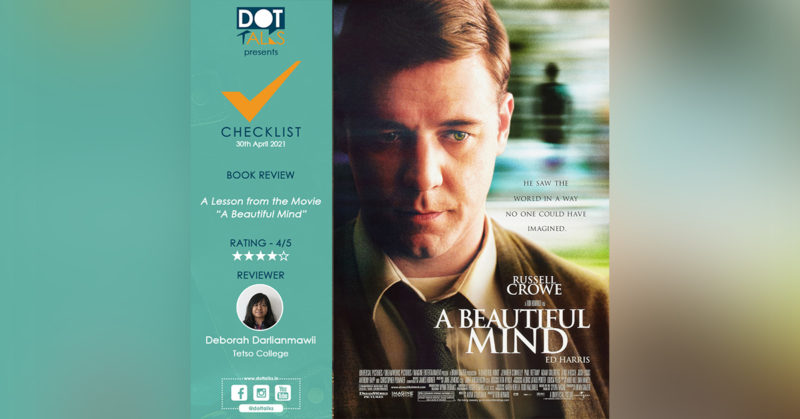| Name of the movie | A Beautiful Mind |
| Starring | Russell Crowe, Ed Harris, Jennifer Connelly |
| Director & Year of Release | Ron Howard, 2001 |
| Studio | Universal, DreamWorks |
Movie Review: A Lesson from the Movie “A Beautiful Mind”
CHECKLIST RATING: 4/5
Reviewer: Deborah Darlianmawii
“But I’ve gotten used to ignoring them.
And I think as a result they’ve kind of given up on me.
You think that’s what it’s like with all our dreams and our nightmares, Martin?
You’ve got to keep feeding them for them to stay alive?”
The above lines are from the 2001 biographical movie, “A Beautiful Mind” which strikes me as I re-watched the movie a few months back and it continues to linger on my mind since then. This writing is about the applicability of the above lines in other areas of life, and not necessarily what it implies in the movie.
To give a little background of the movie, it is about John Nash (1928-2015), a great mathematician, a Nobel Laureate in economics (1994) who was ultimately diagnosed with “paranoid schizophrenia” on his return visit to Princeton[1]. The diagnosis eventually led to his divorce, but the wife Alisha Larde continues to be his caretaker and later remarried (until they eventually died in a car accident[2]). Towards the halfway of the movie, it is evident that the conversations he has had with his friend Charlie, Charlie’s niece and Parcher took place just in his imagination. In addition, the movie is an inspiration of a bestseller book (Pulitzer Prize nominated in 1998) under the same name written by Sylvia Nasar; directed and the screenplay was written by Ron Howard and Akiva Goldman respectively; with production companies like Universal Pictures, DreamWorks Pictures and Imagine Entertainment.
What I would like to point out here is Nash’s remarks on his condition when asked by a friend when he went back to Princeton University in October 1978 to start teaching again. When asked by his colleague Martin, “ What about.. are they gone?” He said (after a long pause and looking towards his right side looking at them), “No, they’re not gone. Maybe they never will be. But I’ve gotten used to ignoring them. And I think as a result they’ve kind of given up on me. You think that’s what it’s like with all our dreams and our nightmares, Martin? You’ve got to keep feeding them for them to stay alive?”

The movie beautifully portrays the scene showing his disengagement with his imaginary friends; his friend Charles, Marcee (Charles’ niece) and Parcher (who he identifies as a member of the Department of Defense of the United States), walking alongside him, hoping to be entertained by Nash.
The line which I emphasized above applies to other areas of life to ensure a productive and positive life. The relevancy can be explained in the following three simple ways. Firstly, it is applicable when as simple as idleness entangles us and tries to divert us from our goals. During those situations, I would say it counts if we have the strength to let go and discontinue feeding them. Secondly, by having a disregarding/diverting mannerism, to any kinds of distractions, be it in the form of people or technology, enables us to achieve the atomic goals we have each day. And lastly, from a moral perspective, the above lines can be explicated as not giving into “temptations” by not entertaining those “unwanted/unproductive” desires.
Hence, I would like to conclude this review by saying that idleness, distractions, “temptations” or in other words, negativities, distractions, and lack of motivations, are a part of life and will continue to be so as long as we live. But what counts is that amidst of all these, we can choose to stop feeding them and continue to live utilizing our potential fully as Nash did.
[1] “A Beautiful Mind.” Wikipedia. Accessed October 26, 2020. https://en.wikipedia.org/wiki/A_Beautiful_Mind_(film).
[2] “John Forbes Nash Jr.” Wikipedia. Accessed October 27, 2020. https://en.wikipedia.org/wiki/John_Forbes_Nash_Jr.
Written on 27 October, 2020. Published on MyMusings0504.
CHECKLIST is a review column initiated by Tetso College that aims at giving students, reviewers and writers a platform to review and reflect upon books, movies, television shows, documentaries, magazines, restaurants and catering services, games, software, and product reviews. The reviews should be a reflective writing encompassing the writer’s opinions about the subject matter while avoiding unprecedented subjective bias. This is an unsponsored review column. The views expressed here do not reflect the opinion of the Institution.
Type your review in a Google Docs or MS Word document and email it to dottalks@tetsocollege.org.

